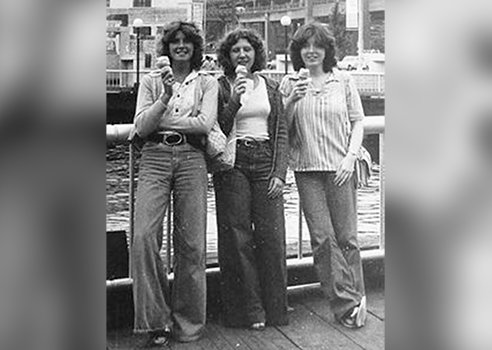Reading time: About 3 minutes
Have you ever struggled with how to make writing easier? Here are some tips I’ve picked up as I’ve aged…
I have a weird psychological quirk. Significant birthdays — ones ending in 0 — never upset me. Instead, I get freaked out by ones ending in seven. Somehow, the oddness of the number, as well as its proximity to an important date, is enough to set my little heart palpitating.
I turn 57 this August, so perhaps you can see where this is headed…
I’ve been thinking recently about how I’ve changed over the years. You can see a picture of me as a rather chubby 20-year-old, adjacent. I’m the one, far right, with friends in Seattle. Since then, I’ve turned from a person not particularly interested in kids to an enthusiastic mother of triplets. Transformed from a career-track news editor and executive to a work-from-home self-employed consultant. Changed from someone who hated writing but adored editing (couldn’t get enough of it) to a person who enjoys both equally.
It’s made me ponder: what lessons do I wish my younger self had known? Here are five of them.
- Writing better won’t make you happy (that’s because we all change our own goal posts as soon as we improve, wanting to become even more skilled). But being happy will make you write better. I know this is counterintuitive, however, Shawn Achor has done lots of research on the topic and I find his evidence convincing. If you don’t believe me, check out his TEDx talk or his book The Happiness Advantage. Bottom line: sitting at a desk is never going to make you happier. Instead, volunteering, meditating, being grateful and giving yourself plenty of time for friends/music/reading/exercise are more likely to do the trick.
- It’s better to write a little bit every day than a whole lot irregularly. This week I reached 60,000 words (whoot whoot!) in the first draft for my latest book. And I’d started only in November. If I’d known I could do such a thing in just 30 minutes/day, five days a week, I surely would have produced 20 books (maybe more) by this point in my life. But I’m not complaining. I’m just glad I discovered this while I still have breath in me. If you’re wanting to write but having a hard time starting, I suggest you begin with the magic of five minutes.
- The best time to write is first thing in the morning. As a former night owl, I feel the pain you may experience when reading this (and I also know that no one rule applies to 100% of readers.) But there are six key reasons that mornings work. For me, the most compelling is that we have more willpower in the mornings and it’s a limited resource. So if you’re challenging yourself with other willpower-related tasks during the day (say, exercising, eating better, not screaming at your kids) your reserves may be depleted by the time the evening rolls around.
- Writing a first draft without editing (until later) will allow you to spend your time more fruitfully. Writing well isn’t so much a question of talent as one of hard work and determination. The best writers in the world are always the best re-writers. If you can squeeze out your first draft as quickly as possible you’ll have more time to devote yourself to rewriting it, the quality of your work will improve vastly. Good writers rewrite harder. And more frequently. Famed New Yorker writer Brendan Gill typically rewrote his pieces 17 times!
- Never worry about pleasing anyone — especially not yourself — with a first draft. I’m a big believer in the crappy first draft. This means you’ve put your words on the page without angst. And, now they can be tweaked, fiddled with, edited. You can move things around. You can add things. You can even delete! The more thoroughly you understand that what you write in a first draft is completely unimportant, the less likely you are to ever suffer a nanosecond of writer’s block. So you write crap. So what? No one has to see it. And you can edit it into something excellent, later.
One of the things I’ve learned in my almost 57 years of living and 37 years of writing is to be more forgiving. I now do a way better job of forgiving myself and moving on.
In future, I think that will help make 60 (or maybe I should say, 67) less daunting.
What are the tips you’d like to give your younger writer? We can all help each other so please share your thoughts with my readers and me. If you comment on my blog by May 31, 2014 I’ll put your name in a draw for a copy of the delightful non-fiction book Stumbling on Happiness by Daniel Gilbert. Meanwhile, congratulations to Maureen Bayless, the winner of this month’s book prize — the Andre Agassi autobiography Open — for her comment on my April 8 blog post. If you’re having a hard time finding the comments box, please go here and keep scrolling down.


